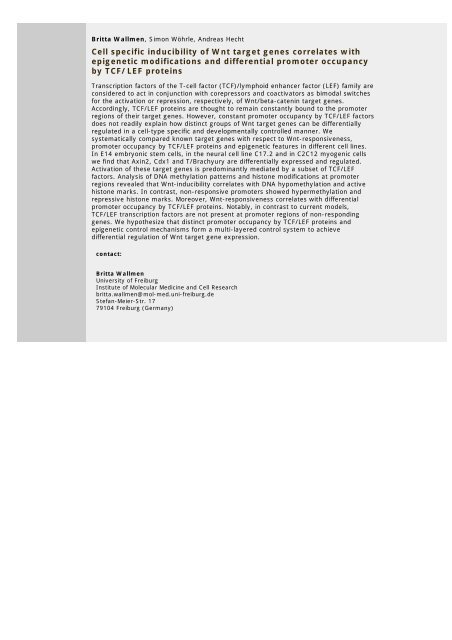Abstracts (poster) - Wissenschaft Online
Abstracts (poster) - Wissenschaft Online
Abstracts (poster) - Wissenschaft Online
Create successful ePaper yourself
Turn your PDF publications into a flip-book with our unique Google optimized e-Paper software.
Britta Wallmen, Simon Wöhrle, Andreas Hecht<br />
Cell specific inducibility of Wnt target genes correlates with<br />
epigenetic modifications and differential promoter occupancy<br />
by TCF/LEF proteins<br />
Transcription factors of the T-cell factor (TCF)/lymphoid enhancer factor (LEF) family are<br />
considered to act in conjunction with corepressors and coactivators as bimodal switches<br />
for the activation or repression, respectively, of Wnt/beta-catenin target genes.<br />
Accordingly, TCF/LEF proteins are thought to remain constantly bound to the promoter<br />
regions of their target genes. However, constant promoter occupancy by TCF/LEF factors<br />
does not readily explain how distinct groups of Wnt target genes can be differentially<br />
regulated in a cell-type specific and developmentally controlled manner. We<br />
systematically compared known target genes with respect to Wnt-responsiveness,<br />
promoter occupancy by TCF/LEF proteins and epigenetic features in different cell lines.<br />
In E14 embryonic stem cells, in the neural cell line C17.2 and in C2C12 myogenic cells<br />
we find that Axin2, Cdx1 and T/Brachyury are differentially expressed and regulated.<br />
Activation of these target genes is predominantly mediated by a subset of TCF/LEF<br />
factors. Analysis of DNA methylation patterns and histone modifications at promoter<br />
regions revealed that Wnt-inducibility correlates with DNA hypomethylation and active<br />
histone marks. In contrast, non-responsive promoters showed hypermethylation and<br />
repressive histone marks. Moreover, Wnt-responsiveness correlates with differential<br />
promoter occupancy by TCF/LEF proteins. Notably, in contrast to current models,<br />
TCF/LEF transcription factors are not present at promoter regions of non-responding<br />
genes. We hypothesize that distinct promoter occupancy by TCF/LEF proteins and<br />
epigenetic control mechanisms form a multi-layered control system to achieve<br />
differential regulation of Wnt target gene expression.<br />
contact:<br />
Britta Wallmen<br />
University of Freiburg<br />
Institute of Molecular Medicine and Cell Research<br />
britta.wallmen@mol-med.uni-freiburg.de<br />
Stefan-Meier-Str. 17<br />
79104 Freiburg (Germany)

















